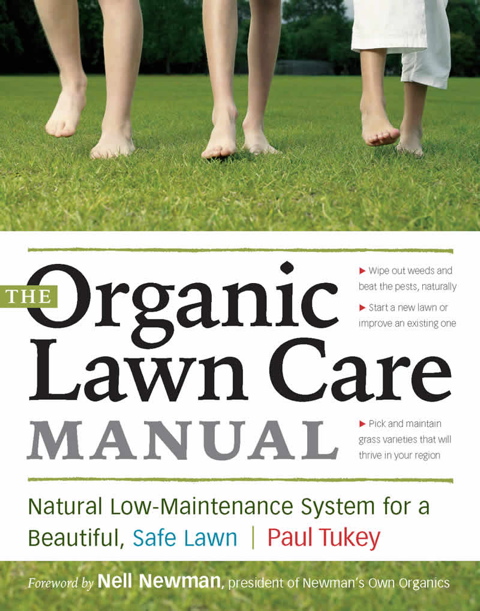

I fortuitously stumbled across the The Organic Lawn Care Manual at the bookstore while searching for a long, captivating book to force upon my pre-teen son to read during a school break. Mission accomplished; with my new lawn Bible in one hand and a weighty kid's tome in the other, I walked home geared up for gardening (and parenting). The author, Paul Tukey, a lawn care professional, publisher of the gardening magazine People, Places and Plants and executive producer of an HGTV show of the same name, enthusiastically presents straightforward, practical how-to methods for safe and effective lawn care.
Tukey had been the owner of a lawn care company in New England for many years before he decided to stop using lawn pesticides on his customer's lawns. After a spring of regularly spreading weed 'n' feed, Tukey began suffering from nosebleeds and shortness of breath at the end of each workday. After stopping the applications of lawn chemicals, coincidentally or not, his health problems went away. "We are seeing only the tip of the iceberg," says Dr. Michael Surgan, the leading environmentalist for the New York state attorney general's office. "In the coming years, many years, many more lawn care products that are currently on the market will be proved to be dangerous."
Tukey's beautiful book will walk you through every step from evaluating your turf, grass anatomy, soil structure, changing your lawn's diet, dealing with weeds and thugs, to watering, mowing and maintenance. The book is filled with clear and concise charts, stunning photography and a plethora of useful gardening tips and essentials to keep your lawn looking far better than the Joneses without polluting the entire zip code.
67 million pounds of pesticides are applied to roughly 30 million acres of lawns in the U.S. each year and homeowners are using 40-60 percent of their summer water allotment on their lawn. Lawn grass is the #1 most water intensive crop in the US. The average lawn is doused with 10,000 gallons of water each year. (Not rainfall.) Is a plot of tedious turf really worth all the fanfare?
In case you're considering taking out all or part of your thirsty, self-absorbed lawn and replacing it with native or drought tolerant plants that can stand some foot traffic and ask for little in return, there's a chapter dedicated to alternative groundcovers as well.
Being a compost queen, I have always fertilized my lawn by sprinkling compost on it in the spring and fall. In the "Changing your Lawn's Diet" chapter I was thrilled to see I was doing the right thing. Applying compost builds soil structure and adds soil life. Grass needs organic matter to thrive. The author's grandmother used 'compost tea' in her yard religiously. Tukey suggests spraying compost tea several times a year on lawns and shows how to make your own backyard batch for your grass to drink at seasonal tea parties.
With research based on solid, proven science that's supported by the work of soil biologists, plant breeders, educators, engineers and leading turf professionals, the author builds a strong case for environmentally friendly lawn care. Not only are natural lawns safer for children, pets and the environment, they use fewer fossil fuels, water and fertilizer. Dr. David Pimentel, of Cornell University, estimates that is takes about 33,000 cubic feet of natural gas to create 1 ton of nitrogen, enough for about 150 of those 40-pound bags of 32-10-18 fertilizer. (That's enough natural gas to heat the average American home for a half a year!)
As Nell Newman, President of Newman's Own Organics writes in the foreword to the book,
As credible scientists make direct links between higher rates of childhood cancers and increased use of lawn pesticides, I hope that every state develops laws at least as restrictive as those in Connecticut where it is illegal to apply pesticides near schools and day care centers.
Tukey, who claims he is still addicted to mowing, to the straight-line patterns of turf and to the scent of freshly cut grass, is utterly certain you can have a beautiful lawn without a synthetic chemical program. Lastly, for you sports enthusiasts, the book devotes a chapter to which kind of turf is best suited for playing croquet, wiffle ball, badminton, bocce and disc golf. And you thought organic gardeners were too serious...
For more about organic lawn care, see
www.safelawns.org
To talk dirt and nerd it up with Annie visit www.dirtdiva.com
